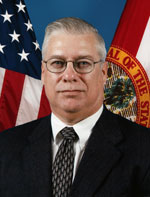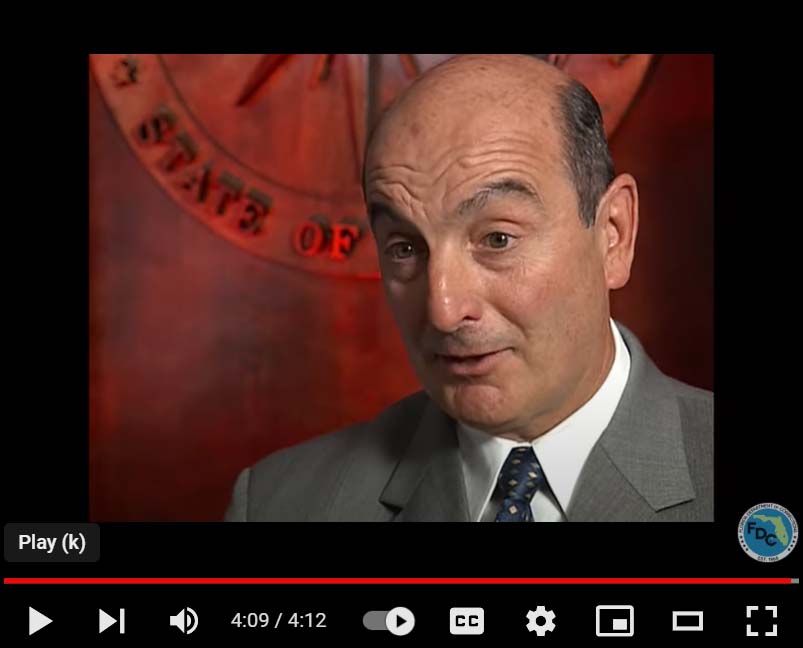2007
OFFENDER POPULATION JUNE 30, 2007
INMATES: 98,192
SUPERVISED: 153,692
INMATES: 98,192
SUPERVISED: 153,692

Former Secretary
James Crosby
On April 24, 2007, former Corrections Secretary James Crosby is sentenced to eight years in federal prison for accepting $130,000 in kickbacks from a prison contractor. He is released from prison on April 11, 2013 and becomes a preacher. In 2020, Crosby is elected City Clerk of his hometown of Starke, Florida. His duties include “preparing the city’s budget, issuing utility bills, and overseeing the city’s Building and Zoning Department.”
Assistant Secretary of Institutions George Sapp sends the following letter to all staff, giving voice to the sentiments of many. Sapp also thanks staff for staying with the Department during this dark chapter, emphasizing that honor, integrity and honesty not only define us as individuals, but as an agency.
MESSAGE FROM ASSISTANT SECRETARY SAPP

George Sapp, Assistant
Secretary of Institutions
As a servant of this Department for over 27 years I feel compelled to provide you with my personal perspective on the recent chapter in the Department’s history.
While none of us is without shortcomings, we must overcome the temptations that would push us toward the realm of corruption and other misdeeds. The sentencing of former Secretary James Crosby in Federal Court by Judge Covington was the end result of leadership gone awry.
He and others must now pay the price for their actions. Despite the problems with prior senior leadership we should recognize that there were many good Department employees who held their heads high, continuing to do the job for which they were hired in a professional and ethical manner.
When you are given the responsibility of guarding the public trust it is an awesome duty. As you can see from a transcript of the court proceedings there is no greater sin for a public official (of which we all are) than to violate the trust placed in us. There is no such thing as being “a little corrupt.”
Everyone should hold the Oath of Allegiance and the Code of Conduct as their mantra. Every Department employee is charged with these responsibilities. We are a nation of laws and as you saw in this case none of us is above the law. I have said many times that if you do the right thing for the right reasons, everything will fall into place.
We must continue to hold our honor, integrity and honesty close to our hearts. These attributes define who we are as individuals and as an agency. I personally want to thank all who stayed with the agency and fought through this difficult time. We are charged by the state with a very difficult mission and I have no doubt that we will continue to be the professionals we are as we carry out that mission.
Continue to do well and be safe.
George Sapp
Assistant Secretary of Institutions
SECRETARY'S MESSAGE
There are two unequivocal facts about the Department of Corrections: 1) Our mission is significant and unique; and 2) What we are called to do is subject to scrutiny and criticism. These facts will never change - nor should they. Criticism may be unfair at times and final judgment is ultimately in the eye of the beholder, but I firmly believe that these facts make us better and stronger by challenging us to persevere and meet our formidable mission. In the words of Thomas Edison, “Restlessness and discontent are the first necessities of progress.”
This past year, the culture of the Department has improved, as we have inspired in our workforce a climate to promote ethics, integrity, and professionalism. We realize the importance of our Code of Conduct. These are not mere words printed on paper. They are inherent qualities to achieve exemplary public service, a commitment to public safety, the support and protection of fellow co-workers and the proper supervision, care, and transition of nearly a quarter-million inmates and community-supervised offenders.
It is my belief that these characteristics and the processes we have implemented will prepare us to meet even greater challenges. Likewise, I am proud of what our 27,000 employees both accomplished and overcame in 2006-2007.
Late 2006, questions arose in regard to the Department of Corrections’ execution procedures. As a matter of fidelity to the laws that govern us, the Department completed an immediate and thorough appraisal of its procedures. We set three guiding principles to shape this review: 1) The Department must put foremost the objective of a humane and dignified death; 2) While the entire process of execution should be transparent, the concerns and emotions of all those involved must be addressed; and 3) Without impinging on the other principles, the execution should not be of long duration. We subsequently implemented both our observations and the many recommendations of the Governor’s Commission on the Administration of Lethal Injection.
Spring 2007, several employees were involved in a series of dehumanizing and degrading behaviors at Hendry Correctional Institution. However, an aggressive and immediate response that same evening contained the situation. An aggressive and continued pursuit of the facts resulted in the uncovering of additional unsavory incidents. While these incidents were disturbing, they remind us that we must remain vigilant and restless in our efforts to maintain law, ethics and morality. There will always be a few amongst us who challenge our entirety. Ultimately, we are judged by how we respond to the challenge.
The Department’s Office of the Inspector General has been instrumental in both meeting the challenges of that evening at Hendry and the challenges of the longterm. When proper systems are in place, corruption or the potential for corruption can be overcome at any level of the Department. From 1999 to 2006, the Office of Inspector General was first reduced in size by a leadership eager to cut and then curtailed in scope by a leadership anxious to stifle insights into internal Department behavior. However, a renewed focus on proper staffing, organization and autonomy has been essential to the Office’s renewed efforts to prevent incidents like those at Hendry from going unchecked.
- In 2006-2007, the Office completed 25 audits/reviews, as compared to 10 in 2004-2005.
- The Office’s Drug Detection Canine Unit and Contraband Interdiction Unit both continued to serve our many institutions, maintaining security as it pertains to the introduction of illegal and dangerous substances.
- The use of monitoring activities over inmate telephone conversations allowed the Department to intervene in numerous attempts to smuggle drugs into prison facilities.
- Additionally, the Bureau of State Investigations has implemented initiatives that appear to successfully curb the perpetuating of isolated incidents, including the establishment of early warning systems to track and prevent staff misconduct.
May 2007, Assistant Secretary of Institutions George Sapp addressed the Department, writing, “I have said many times that if you do the right thing for the right reasons, everything will fall into place.” Continuously, the many capable leaders of the Department have proven this statement true. As we enter 2008, I am confident in our current leadership – senior leadership, regional directors, wardens, circuit administrators and many others. These fine professionals were instrumental in rebuilding the image of the Department, consistently demonstrating that their word is their bond.
 Click here to hear Secretary McDonough talk about what surprised him the most about corrections.
Click here to hear Secretary McDonough talk about what surprised him the most about corrections.
Systems are now in place to ensure staff is treated fairly and with dignity:
- The random drug testing policy for employees in Florida law was implemented to help those who test positive get a chance to rehabilitate and contribute to the agency – not as punishment.
- The Department has corrected a merit promotion system that in recent years had allowed for decisions that were arbitrary, punitive and showed favoritism. Current promotion procedures consider a variety of factors including training, education, experience, performance quality, length of service, time in grade, and potential to serve at a higher level of responsibility. Promotion eligibility is tied to specific training, past disciplinary actions and overall performance records. Nepotism and cronyism are not tolerated.
- Physical fitness has been emphasized and taken root in the Department, aided by an improved importance on health lifestyles.
In order to attract the finest recruits, a dynamic recruitment campaign featuring our own employees was developed to advertise careers within the Department. A recruitment website http://fldocjobs.com, and toll-free number 1-866-JOB-FDOC were created for potential applicants. These tools provide interested applicants one single point of contact in pursuing a career within the Department of Corrections. This has assisted the Department in reducing vacancies statewide but particularly in critical areas such as in Region IV. The vacancy rate for this region alone dropped nearly two percent from 5 to 3.2 percent.
Additionally, we placed into law accountability measures and internal oversight mechanisms to ensure that employee clubs expend funds in support of programs and activities that increase employee morale and strengthen the institution’s relationship with the community.
An innovative initiative implemented this year helping victims and their families of crime was the Cold Case Cards program involving a partnership between the Department, the Florida Department of Law Enforcement, the Attorney General’s Office and Crime Stoppers programs throughout Florida. By distributing thousands of decks of cards featuring unsolved murders or missing person’s cases to Florida inmates, the Department is doing its part to help solve these cases. Inmates can call the tip line anonymously and claim a reward if their tip about a case leads to an arrest. Since the program’s inception in July 2007, there have been two arrests for previously unsolved homicide cases. Recognized nationally, the Florida Department of Corrections is the first prison system in the country to distribute Crime Stoppers Cold Case Playing Card decks to prison inmates.
As public safety is our charge, we continue to reap the successes of our absconder initiative, soliciting the assistance of numerous state and federal agencies in this effort. Since February 2006, we have seen a 31.2 percent decrease in the number of absconders (44,020 to 30,276).
Also on the Community Corrections front, I am proud of our probation officers for their consistent and thoughtful implementation of the Department’s modified “Zero Tolerance” policy. Since we updated the policy, to stress that only “willful” violations of probation be reported, we have seen a 22 percent decline in the number of technical probation violations. This is good for both the criminal justice system as a whole and our individual probation officers, who are often stretched-thin, to address a demanding workload.
Amongst our agency’s accomplishments was the revision of our mission statement to include the reentry of prisoners into society. Our mission statement now reads:
“To protect the public, ensure the safety of Department personnel, and provide for the proper care and supervision of all offenders under our jurisdiction while assisting, as appropriate, their reentry into society.”
A successful reentry into free society is an essential tenet to maintaining public safety. Crime deterrence is the greatest means to protect Floridians from becoming the victims of crime. Our goal is to bring the recidivism rate (recommitment to prison) down from its current rate of 32 percent to 20 percent by 2012. This past year, we took several necessary steps to enhance our reentry efforts, including:
- Implementation of Governor Crist’s initiative to automatically restore the civil rights of exoffenders, who have already paid their debt to society. The Restoration of Civil Rights is often a key ingredient in obtaining meaningful employment for ex-offenders, thereby reducing the future occurrence of crime. In six months time, Institutions and Community Corrections staff vigorously reviewed the files of 280,712 ex-offenders, finding
150,663 possible candidates for restoration of civil rights. - Initiation of a comprehensive strategic plan for reentry.
- Aggressive pursuit of federal reentry grants.
- Institution of new policies for the 100-Hour Transition Program.
- Coordination of reentry seminars at correctional institutions, and developing a plan to take this initiative statewide.
- Completion of a pilot program at Wakulla C.I., testing viable options to provide inmates with a valid form of identification upon release.
- Completion of a computer-based literacy pilot initiative and, subsequently, expansion into 18 institutions.
- Partnership with the state courts and numerous state agencies, including the Departments of Children and Families and Juvenile Justice, to improve services for the mentally ill.
 Click here to hear Secretary McDonough talk about the mental health system.
Click here to hear Secretary McDonough talk about the mental health system.
 Click here to hear Secretary McDonough talk about his pragmatic approach to achieving lower recidivism rates.
Click here to hear Secretary McDonough talk about his pragmatic approach to achieving lower recidivism rates.
I am proud of the great strides the Department of Corrections has made in the past year, and anticipate further improvements. I am grateful for the privilege of serving alongside the men and women in the finest corrections department in the nation to fulfill the oath we have taken to our office and to the constitutions of the State of Florida and the United States of America.
Secretary James R. McDonough
 Click here to hear Secretary McDonough talk about his interactions with inmates.
Click here to hear Secretary McDonough talk about his interactions with inmates.
- 1821-1845
- 1868-1876
- 1877-1895
- 1900-1919
- 1921
- 1922-1924
- 1927
- 1928-1931
- 1932 | CHAPMAN
- 1933-1935
- 1936-1939
- 1940-1945
- 1946-1949
- 1950-1955
- 1956-1961
- 1962 | WAINWRIGHT
- 1963-1965
- 1966-1969
- 1970-1975
- 1976-1979
- 1980-1986
- 1987 | DUGGER
- 1988-1990
- 1991 | SINGLETARY
- 1992-1995
- 1996-1998
- 1999 | MOORE
- 2000-2002
- 2003 | CROSBY
- 2004-2005
- 2006 | MCDONOUGH
- 2007
- 2008 | MCNEIL
- 2009-2010
- 2011 | BUSS
- 2011 | TUCKER
- 2012 | CREWS
- 2013-2014
- 2014 | JONES
- 2015-2018
- 2019 | INCH
- 2020-2021
- 2021 | DIXON
- 2022-Today
- Population Summary Table

